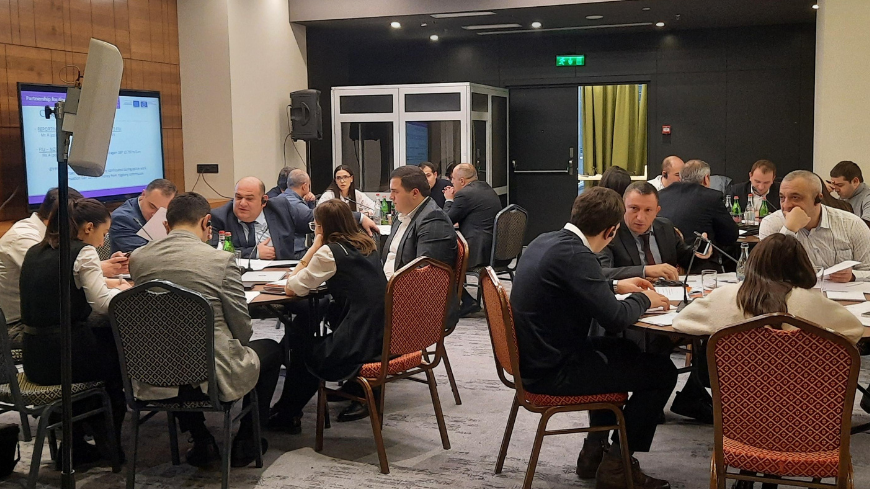The Armenian authorities have set the fight against corruption and other economic crimes as a top national priority, and undertaken major legislative and institutional reforms in this direction. These include the establishment of a dedicated chain of Law enforcement and criminal justice institutions to specifically target corruption, money laundering and related offences, namely the Anti-Corruption Committee, created in 2021, Departments dedicated to economic crime and asset recovery within the General Prosecutor’s Office, as well as Anti-Corruption Courts launched in 2022.
The national framework is therefore in place for the specialisation of professionals in the area of financial investigations, and the prosecution and adjudication of economic crime. However, challenges remain for the relevant authorities to be able to conduct full-fledged financial investigations, and to effectively use their results for the prosecution and adjudication of crime, as well as the confiscation of criminals’ assets. In particular, advanced skills in financial investigations are required in order for the new legal framework to be adequately applied. Moreover, a substantive shift of mentality and practice at all levels of the system is also needed, for the strategic orientation of investigations, prosecution approaches and final judgements to achieve better results in the fight against economic crime and in the recovery of proceeds from crime.
In order to help bridge this gap between the legal and institutional advancements and the actual practice, upon request from the Armenian authorities, the Project delivered two consecutive training courses on “Using Financial Investigations to Fight Economic Crime and Recover Assets” to a total of 65 representatives of investigative, prosecutorial, and judicial authorities involved in anti-corruption and anti-money-laundering in Armenia.
These training events followed the production, earlier on in the Project’s implementation, of a technical guidance package on financial investigations into money laundering and terrorism financing. This package consisted in a Handbook on the investigation, prosecution, and adjudication of money-laundering and terrorist financing cases in Armenia, as well as a practical Procedural Manual for investigators and prosecutors (in 2021). Both the Handbook and the Procedural Manual were updated prior to the training, taking into account recent evolutions in the Armenian legislation.
The training programme was designed as a practical capacity-building exercise, bringing together the different functions of the investigative, Law enforcement and judicial system against corruption and other economic crimes in Armenia, in order to examine, discuss and experiment the functioning and use of financial investigations and promote improvements in the current practice. It covered international standards and latest practices, but also the specificities of the Armenian system, including recent legal reforms, through substantive contributions from both international and national Council of Europe experts and practitioners in the field. The training methodology was highly interactive, with hands-on scenario-based exercises and guided discussions. This approach allowed participants to examine and understand the different stages of financial investigations, the application of specific techniques, and resolve practical challenges, but also to share and discuss their own experience and concerns in the conduction of financial investigations, and in the strategic use of their outcomes for more effective prosecution and adjudication of corruption and money laundering, and for increased confiscation of criminal proceeds.
As an additional benefit, the events also stimulated the enhancement of inter-agency cooperation at national level, through lively exchanges among the represented institutions, namely the Anti-Corruption Committee, the Investigative Committee, the National Security Service, different Departments of the General Prosecutor’s Office, Anti-Corruption Courts at different levels, the national Financial Intelligence Unit and the Ministry of Justice. Taking into account the collaborative approach and complementary competencies needed for financial investigations to be conducted successfully, participants reflected on their respective roles, capacities and possible contributions to the improvement of the quality and effectiveness of financial investigations in Armenia.
Deputy Minister of Justice Ms Armenuhi Harutyunyan expressed particular gratitude to the European Union and the Council of Europe for the support provided to the reforms implemented in the Armenian justice and anti-corruption sector within the framework of the "Partnership for Good Governance" programme. She highlighted the importance of these training courses for the country, as an opportunity for the practitioners of specialised bodies to acquire new knowledge and skills in the field of investigation of cases involving corruption and other economic offences, and to achieve the recovery of funds obtained as a result of such offences.
The Council of Europe will continue to help build national capacities against economic crime in Armenia, through a series of follow-up activities based on the needs identified and expressed by the national beneficiaries.
These activities were organised in the framework of the Project on “Strengthening institutional capacities to fight and prevent corruption in Armenia” which is co-funded by the European Union and the Council of Europe and implemented by the Council of Europe in their Partnership for Good Governance II.





